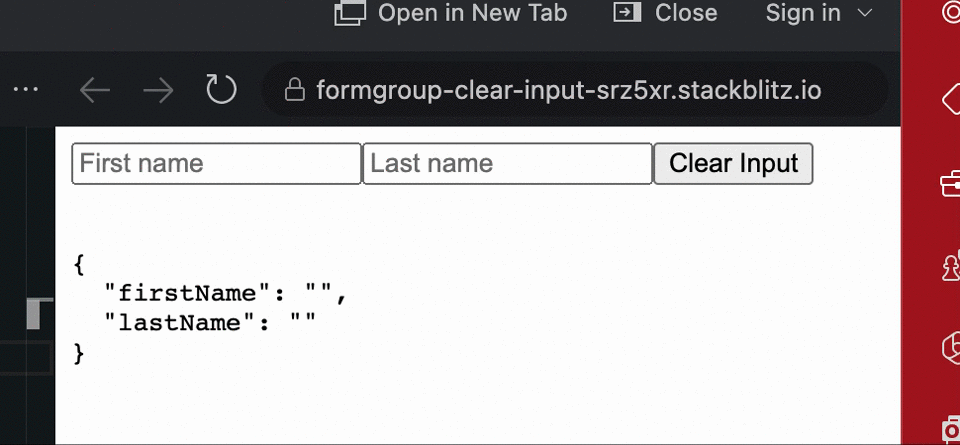I have a reactive form with two fields.First is custom input using ControlValueAccessor, and last is just regular HTML input.
Problem is, after performing form.reset(), the value of custom input is retained event its value in reactive form is null already.
As you can see in image, the first time I input and clear the values, it is working well.
But, as second time and onwards, the input value is STILL retained in custom input component. While, the normal HTML input is cleared and working well regardless of how many times I click Clear Input. Can you help me, please? Did I miss to put something?
Files:
- app.component.ts/html: where the form lives
- custom-input.component.ts/html: custom input component
Here is the form:
ts file
import { Component } from '@angular/core';
import { FormBuilder, FormGroup } from '@angular/forms';
@Component({
selector: 'my-app',
templateUrl: './app.component.html',
})
export class AppComponent {
form: FormGroup;
constructor(private fb: FormBuilder) {
this.form = this.fb.group({
firstName: [{ value: '', disabled: false }],
lastName: [{ value: '', disabled: false }],
});
}
clearInput() {
this.form.reset();
}
}
html file:
<form [formGroup]="form">
<app-custom-input formControlName="firstName"></app-custom-input>
<input formControlName="lastName" placeholder="Last name" />
<button (click)="clearInput()">Clear Input</button>
</form>
<br />
<pre>{{ form.value | json }}</pre>
Here is the custom input file:
ts file:
import { Component, forwardRef } from '@angular/core';
import { ControlValueAccessor, NG_VALUE_ACCESSOR } from '@angular/forms';
@Component({
selector: 'app-custom-input',
templateUrl: './custom-input.component.html',
providers: [
{
provide: NG_VALUE_ACCESSOR,
useExisting: forwardRef(() => CustomInputComponent),
multi: true,
},
],
})
export class CustomInputComponent implements ControlValueAccessor {
value: string;
changed: (value: any) => void;
touched: () => void;
isDisabled: boolean;
writeValue(value: string): void {
this.value = value;
}
registerOnChange(fn: any): void {
this.changed = fn;
}
registerOnTouched(fn: any): void {
this.touched = fn;
}
setDisabledState(isDisabled: boolean): void {
this.isDisabled = isDisabled;
}
onChange(event: Event): void {
const value: string = (<HTMLInputElement>event.target).value;
this.changed(value);
}
}
html file:
<input
placeholder="First name"
[disabled]="isDisabled"
[value]="value"
(input)="onChange($event)"
(blur)="touched()"
/>

